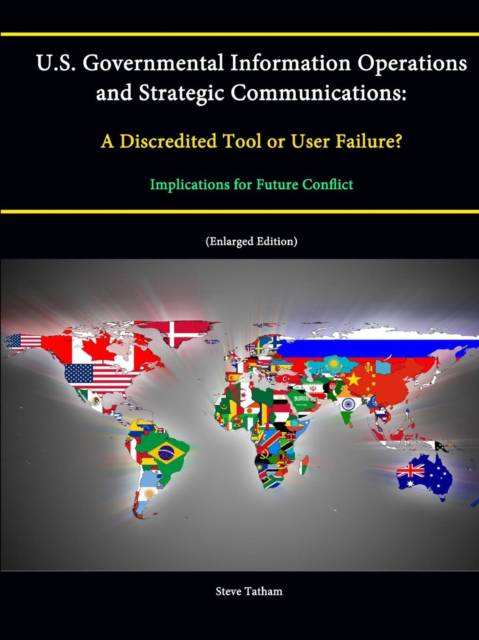
- Afhalen na 1 uur in een winkel met voorraad
- Gratis thuislevering in België vanaf € 30
- Ruim aanbod met 7 miljoen producten
- Afhalen na 1 uur in een winkel met voorraad
- Gratis thuislevering in België vanaf € 30
- Ruim aanbod met 7 miljoen producten
Zoeken
U.S. Governmental Information Operations and Strategic Communications
A Discredited Tool or User Failure? Implications for Future Conflict (Enlarged Edition)
Strategic Studies Institute, U S Army War College, Steve Tatham
Paperback | Engels
€ 17,45
+ 34 punten
Omschrijving
Through the prism of operations in Afghanistan, the author examines how the U.S. Government's Strategic Communication (SC) and, in particular, the Department of Defense's (DoD) Information Operations (IO) and Military Information Support to Operations (MISO) programs, have contributed to U.S. strategic and foreign policy objectives. It assesses whether current practice, which is largely predicated on ideas of positively shaping audiences perceptions and attitudes towards the United States, is actually fit for purpose. Indeed, it finds that the United States has for many years now been encouraged by large contractors to approach communications objectives through techniques heavily influenced by civilian advertising and marketing, which attempt to change hostile attitudes to the United States and its foreign policy in the belief that this will subsequently reduce hostile behavior. While an attitudinal approach may work in convincing U.S. citizens to buy consumer products...
Specificaties
Betrokkenen
- Auteur(s):
- Uitgeverij:
Inhoud
- Aantal bladzijden:
- 98
- Taal:
- Engels
Eigenschappen
- Productcode (EAN):
- 9781304871800
- Verschijningsdatum:
- 3/02/2014
- Uitvoering:
- Paperback
- Formaat:
- Trade paperback (VS)
- Afmetingen:
- 216 mm x 279 mm
- Gewicht:
- 249 g

Alleen bij Standaard Boekhandel
+ 34 punten op je klantenkaart van Standaard Boekhandel
Beoordelingen
We publiceren alleen reviews die voldoen aan de voorwaarden voor reviews. Bekijk onze voorwaarden voor reviews.











